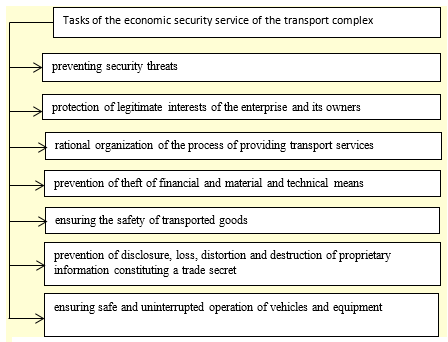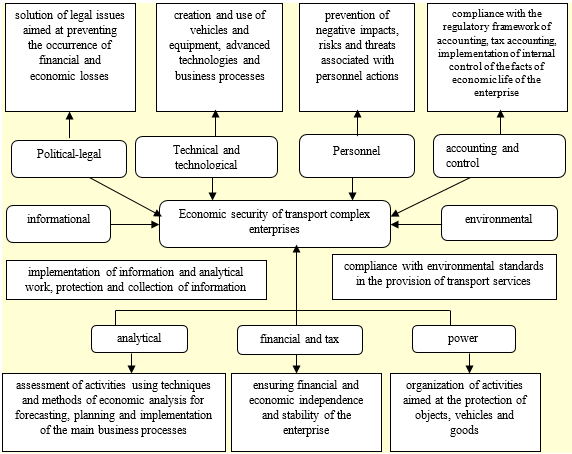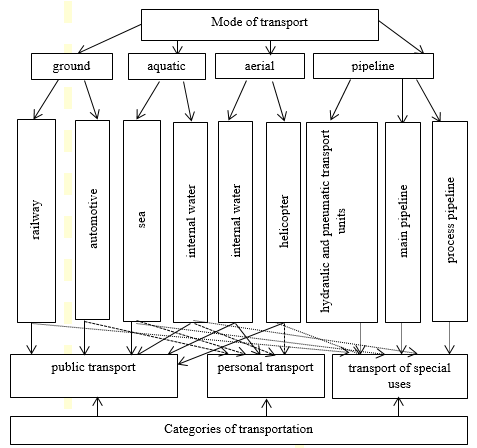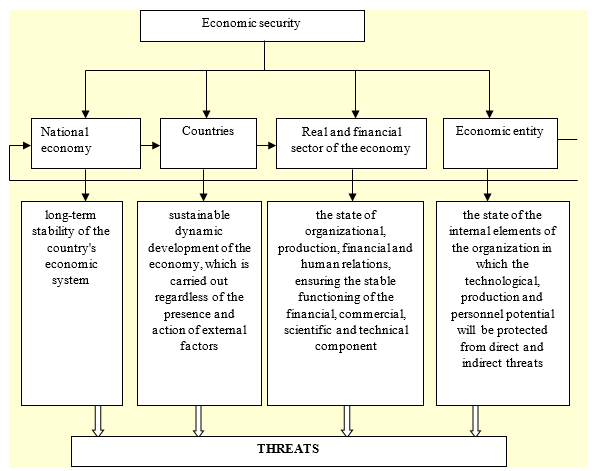Abstract
Issues of economic security of the enterprise are currently relevant due to the aggravation of the international situation. Currently, a huge role is given to maintaining a high level of economic security, which contributes to sustainable financing and achievement of continuous growth of the national economy and economic entities. A common understanding of economic security should be seen as protecting the interests of the enterprise from internal and external threats. This problem is relevant and important for transport enterprises. The importance of transport in the development of the state and in ensuring its economic security is great. The article formulates the interpretation of the definition of economic security of the transport complex. The classification of transport by types and categories is given. The indicators of economic security of the transport complex are presented. The role of transport in ensuring economic security is to implement conditions for maintaining the maximum level of development, allowing for changes in needs of economy and the population engaged in transportation to ensure readiness of the transport complex to work in unforeseen situations, to maintain stability of the functioning of all elements of the transport complex. Tracking and pre-emptive assessment of negative trends in the transport industry from the standpoint of economic security of Russia requires finding solutions to problems of determining the role of transport, choosing a model and organizing monitoring of the transport complex, developing a mechanism for assessing the impact of the transport industry on the socio-economic development of the country.
Keywords: Safetytransportation networkrisksthreatcorporate resources
Introduction
Due to the growth of economic risks and threats, the policy of transport enterprises should be focused as much as possible and aimed at ensuring their economic security. Economic security is a state of the economy, providing a set of conditions and factors that ensure the independence of the national economy, its stability and sustainability, the ability to continuously develop and improve. Economic security of the transport complex enterprise is a system of protection of interests of its participants, management, employees, ensuring rational use of financial, labor and information resources from external and internal threats for the purpose of sustainable business development, the ability to implement an independent economic strategy. Economic security is an element of national security that guarantees the protection of economic interests of the state in the conditions of global competition (Pozdeev, 2016).
The main thing in determining the economic security of the enterprise is that:
- the state of security is dynamic;
- internal threats are no less dangerous than external ones;
- the system of economic security of the enterprise should interact on a legal basis with the state system of security.
Transport security is the state of the transport system, which ensures the sustainable functioning and development of the industry, full and timely satisfaction of the needs of the economy and the population in transportation now and in the long term (Drozdov, Tagiltseva, Vasilenko, & Kuzina, 2017). The transport complex is a part of the regional system that has a significant impact on the functioning of the regional economy, combining production enterprises into a single regional complex, and as a result, the unity of the country's economy. Ensuring economic security is an important national priority, as it is a guarantee of the country's independence, stability and efficiency of society.
Problem Statement
The most effective strategy and tactics to achieve the goals and objectives by which you can determine the future of the transport complex enterprises is monitoring and timely assessment of their economic security, development and implementation of organizational, technical, financial and other measures to counter internal and external threats, organization of services and construction of systems to ensure economic security. Each motor transport complex conducts its economic activities in the external environment and has an internal environment. The external and internal environment in the activities of the organization are sources of threats and dangers, but at the same time are a source of opportunities and contribute to the manifestation of the strong and weak in their activities. In the system of economic security of the transport complex there are closely interrelated object and subject. The object is the stable economic condition of the transport company in the current and long-term period, and the subject is a specialized service of economic security of the transport complex.
Research Questions
The activity of the economic security service of the transport complex is aimed at solving many problems (fig. 1).

All these problems are solved in the process of implementing the functions, the structure of which includes 9 blocks (fig. 2).

A comprehensive analysis of indicators allows us to assess the state of economic security and identify measures to neutralize possible threats. All modes of transport form the basis of the transport system of the Russian Federation, and are designed to provide timely, complete and quality satisfaction of the needs of the population, the economy in transportation (Bogdanova, Kapirin, & Rusinov, 2013). The transport complex is a large multi-sectoral area of activity, including all categories and modes of transport (fig. 3). A comprehensive analysis of indicators allows us to assess the state of economic security and identify measures to neutralize possible threats. All modes of transport form the basis of the transport system of the Russian Federation, and are designed to provide timely, complete and quality satisfaction of the needs of the population, the economy in transportation (Bogdanova et al., 2013). The transport complex is a large multi-sectoral area of activity, including all categories and modes of transport (fig. 3).

Land, water, air and pipeline transport form the basis of the transport system of the Russian Federation and are designed to provide timely, complete and qualitative satisfaction of the needs of the population and the national economy in transportation (Macheret & Kudryavtseva, 2016). The specificity of modes of transport as an economic sphere is that transport participates in the creation of products but does not participate in its production (Marchetti & Wanke, 2019).
The main components of economical safety are presented in fig.
When choosing an effective method of transportation, taking into account the requirements of the market to the conditions of transport services for users, a comparative characteristic of different modes of transport is made (table

The relationship between the levels of economic security, modes of transport and risks is characterized by the fact that rail, road, water, air and pipeline transport is characterized by a crisis, an increase in the level of the criminal component in the country, threats in the form of production costs, an increase in prices for fuel and raw materials, a manifestation of a high degree of corruption, a decrease in the standard of living of the population (Vasilenko, Drozdov, Tagiltseva, Kuzina, & Kuzina, 2017).
Defining the directions of ensuring economic security of the enterprise, two approaches to protection are considered:
1) pre-emptive activities that allow the development and implementation of management measures aimed at preventing or reducing damage;
2) reacting activities, allowing one to carry out a set of measures and measures aimed at identifying factors of violation of the security regime.
Purpose of the Study
The aim of the work is to consider the impact of transport on economic security, which is manifested in the following aspects.
1 Preservation of the common economic space.
2 The high share of the transport component in the cost of domestic products reduces the competitiveness of domestic goods in the world market.
3 Maintenance of tariffs for passenger transportation at a level that ensures normal mobility of the population, a high level of safety and comfort of transportation.
4 Ensuring military mobilization readiness of the country and protection of the population in emergency situations.
Key indicators for quantifying the impact of transport on economic security include:
1) OPF condition (wear and aging, wear coefficient in %);
2) transport security of transportation of products of strategically important industries (coefficient of technical independence);
3) the level of investment in the development of transport (investment ratio, % of total investment in the economy);
4) the level of imports of technical equipment and spare parts (in % of the total number of delivered equipment);
5) level of funds allocated to R & d on transport issues (% of industry revenues);
6) growth intensity (ratio of intensity of growth);
7) financial stability (liquidity ratio, equity ratio, autonomy ratio, coverage ratio);
8) personnel independence (coefficient of personnel independence);
9) competitiveness (the ratio of the market share of the transport organization to the market share of the main competitor);
10) independence of the transport company (independence in the choice and implementation of the strategy, the coefficient of independence of the transport company). Economic security of transport should be assessed using indicators to enable the implementation of:
1) passenger and cargo transportation;
2) renovation, inspection and repair works;
3) maintenance and repair of transport infrastructure elements;
4) The category of the evaluation of condition of economical safety of the enterprise is presented in table
The mechanism of economic security management in the transport industry is based on a comprehensive assessment of trends in the development of economic processes in the industry, identifying threats to economic security, monitoring the actual values of the selected indicators and their thresholds. Based on the results of monitoring, proposals are being developed to improve the level of economic security of the industry and measures to eliminate existing threats to economic security (Salgiriev & Akhmadov, 2013).
The threat to the economic security of the transport enterprise is a set of negative impacts of the external and internal environment factors that prevent or may prevent in the future the effective implementation of the main business processes of the transport enterprise, as well as the achievement of its statutory goals and objectives (Vasilenko, Tagiltseva, Kuzina, & Drozdov, 2017).
Internal factors of threats to economic security appear in the transport company and are directly related to its activities and the activities of hired personnel. They are always due to the main business processes of the transport company and have an impact on the results of its economic activities. The form and quality of organization and implementation of the management process, compliance with technology, organization of labor and social sphere of personnel – all this can become an internal source of economic threats. Examples of such threats are: disclosure of confidential information (trade secrets) by own personnel, low qualification of specialists (Agapova & Yashkina, 2011).
External threats to the economic security of the enterprise transport complex - the emergence – are associated with the external business environment, i.e. these are actions that take place outside the transport enterprise, for example, the prevailing at some point in time market conditions for freight and passenger transportation. In particular, the manifestation of such threats is the theft of property by persons who are not employees of the transport company or illegal actions of competitors (Tagiltseva, Kuzina, Vasilenko, & Drozdov, 2017).
When defining a list of threats to the economic security of a transport complex enterprise, the economic security service should link them to the materiality of the damage (Kuzina, 2011). Thus, the damage may be insignificant, which will not greatly affect the financial condition of the transport company. If there is a risk of such threat, the economic security service should not take significant measures to prevent it, since this is not advisable in terms of financial effect. On the contrary, significant threats entail significant (there is a risk of loss of competitive advantages and the possibility of bankruptcy) and catastrophic losses (termination of activities due to inability to avoid bankruptcy). It is these threats that should be the object of priority attention of the economic security service of the transport enterprise, their timely detection and elimination in order to avoid or minimize losses (Galaburda, 2003).
To ensure economic security, the company uses a set of its corporate resources. Corporate resources are the business factors used by the owners and managers of the enterprise to achieve business objectives and are part of the overall assessment of the level of economic security of the enterprise.
Problems related to economical safety of transport agencies include:
- non-observance of the delivery times of cargo;
- infringement of the cargo integrity is on delivery;
- discrepancy of price and quality of transport service;
- big competition among motor transport enterprises;
- shortage of investments to development of transportations;
- increased wear-and-tear of the transport.
Research Methods
In the article the complex analysis of indicators of economic security of the enterprise is carried out, approaches to an assessment of the level of economic security of the enterprise are considered.
Findings
The analysis revealed that in order to ensure economic security, it is necessary to use corporate resources and to neutralize threats to economic security; transport companies must carry out systematic work to improve the efficiency of their main activities.
Conclusion
Ensuring economic security is an important component of the enterprise management of the transport complex through the organization of the relevant service at the enterprise of the transport complex. Enterprises of the transport complex, which are not capable of adaptation, change, which are not able to show a normal response to external and internal threats, very often become incapable of further existence. Therefore, in order for the enterprise of the transport complex to continue to remain an integral and developing system, the economic security service must immediately respond to all favorable and unfavorable changes in the external and internal environment, which is the main condition for maintaining economic security.
References
- Agapova, Т. N, & Yashkina, S. I. (2011). Feature and threat of supplying of economical safety of railway transport. Russian economic journal, 6, 187–192.
- Bogdanova, Т. V., Каpirin, А. А., & Rusinov, R. V. (2013). Economic safety of transport organisations: scientific – methodical approaches and practice of the evaluation. University bulletin, 21, 32–40.
- Drozdov, N. А., Tagiltseva, J. A., Vasilenko, M. A, & Kuzina, E.L. (2017). Modeling of efficiency assessment for enterprises economic activity in environmental system. in IEEE Conference on Quality Management, Transport and Information Security, Information Technologies (IT&MQ&IS) (pp. 705–709). https://doi.org/10.TMQIS.2017.8085926
- Galaburda, V. G. (2003). The conception of marketing activity of railways in the conditions of their reforming. Economy of railway transport, 3, 42–47.
- Kuzina, E. L. (2011). Algorithm of the evaluation of ecolo – economical safety of enterprises of railway branch. Terra Economicus, 9, 155–158.
- Marchetti, D., & Wanke, P. F. (2019). Efficiency in rail transport: Evaluation of the main drivers through meta-analysis with resampling. Transportation Research Part A: Policy and Practice, 120, 83–100.
- Macheret, D. А., & Kudryavtseva, А. V. (2016). About the evaluation of efficiency of investments to innovative projects. The economy of railways, 12, 21–26.
- Pozdeev, V. L. (2016). Urgent tasks of analysis of economical safety of the enterprise. Journal Account. Analysis. Audit, 2, 16–23.
- Salgiriev, R. R, ^ Аkhmadov, Т. Т. (2013). Rating evaluation of difficult economic systems as the tool of economic analysis, forecast and investment planning. Journal of economic regulation, 4, 47–54.
- Tagiltseva, J. A., Kuzina, E. L., Vasilenko, M. A., & Drozdov, N. А. (2017). Perfecting of the mechanism of acceptance of managerial ecological decisions. Quality. Innovations. Formation, 9, 51–59.
- Vasilenko, M. A., Drozdov, N. A., Tagiltseva, Y. A., Kuzina, E. L., & Kuzina, M. A. (2017). Systematic approach and advanced marketing in public-private partnerships. In IEEE Conference on Quality Management, Transport and Information Security, Information Technologies (IT&MQ&IS) (p. 10). https://doi.org/10.TMQIS.2017.8085753
- Vasilenko, M. A., Tagiltseva, Y. A., Kuzina, E. L., & Drozdov, N. A., (2017). To the question of approaches to acceptance of safe managerial decisions. Quality. Innovations. Formation, 8, 70–77.
Copyright information

This work is licensed under a Creative Commons Attribution-NonCommercial-NoDerivatives 4.0 International License.
About this article
Publication Date
28 December 2019
Article Doi
eBook ISBN
978-1-80296-075-4
Publisher
Future Academy
Volume
76
Print ISBN (optional)
-
Edition Number
1st Edition
Pages
1-3763
Subjects
Sociolinguistics, linguistics, semantics, discourse analysis, science, technology, society
Cite this article as:
Abramov, V., Magomedov, S., Vasilenko, E., Kuzina, M., & Barashyan*, V. (2019). The Impact Of Transport Systems On The Economic Security Of The Enterprise. In D. Karim-Sultanovich Bataev, S. Aidievich Gapurov, A. Dogievich Osmaev, V. Khumaidovich Akaev, L. Musaevna Idigova, M. Rukmanovich Ovhadov, A. Ruslanovich Salgiriev, & M. Muslamovna Betilmerzaeva (Eds.), Social and Cultural Transformations in the Context of Modern Globalism, vol 76. European Proceedings of Social and Behavioural Sciences (pp. 217-226). Future Academy. https://doi.org/10.15405/epsbs.2019.12.04.31
